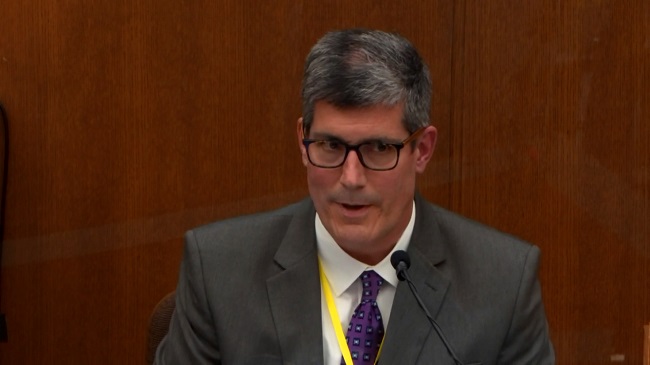Derek Chauvin’s murder trial for the death of George Floyd entered its second and final week with testimony from the medical examiner who conducted Floyd’s autopsy, a key witness whose perspective caused problems for both sides.
Hennepin County Chief Medical Examiner Dr. Andrew Baker
Prosecutors put Hennepin County’s chief medical examiner, Dr. Andrew Baker, to the stand shortly after he met with one of his old mentors, Dr. Lindsey Thomas, to discuss the results of the autopsy on Floyd.

On Thursday, a panel of medical experts concluded that Floyd died of asphyxiation, and retired medical examiner Thomas, who now does consulting work across the country, agreed with that conclusion. Baker gave a new story of Floyd’s death after the witness had left the stand.
Baker has insisted since the postmortem results came in that Floyd died from “cardiopulmonary arrest complicating law enforcement subdual, restraint, and neck compression.” He claimed he couldn’t locate evidence of asphyxiation.
On Friday afternoon, Baker reiterated his belief but added that Chauvin’s restraining of Floyd was still a major factor in his demise. He noted, “He has a heart that already needs more oxygen than a normal heart because of its size,” and added that a coronary artery obstruction made it much more challenging.
Read Also:
- What Is Chauvin Writing During His Trial
- Vanessa Bryant Gives Powerful Speech Inducting Kobe Bryant into Hall of Fame
- Madison City schools Reporting Disruptions to Virtual Learning Platform
He elaborated, saying, “encounters with police enforcement are going to induce stress chemicals to go out into your body, particularly adrenaline.”
Baker came to the conclusion that “the law enforcement subdual, constraint, and neck compression was just too much for Mr. Floyd to handle.”
Due to his divergent opinion from the prosecution’s other medical experts, Baker proved to be a difficult witness for the prosecution to cross-examine and a mixed bag for the defence. Throughout his testimony, he insisted that Floyd’s run-in with the law enforcement was a major contributing factor to his untimely demise.
Given Floyd’s preexisting heart condition and toxicological status (Baker referred to the fentanyl and methamphetamine in his blood), “the stress of that interaction was what sent him over the edge,” Baker added.
The defence counsel Eric Nelson has questioned multiple toxicologists on the potential that Floyd’s death was caused in whole or in part by a fentanyl overdose. Baker strongly refuted that theory, as well as another of Nelson’s, which posits that Floyd’s death was caused by cardiac problems.
When questioned about Floyd’s subdual and neck constraint, Baker stated that “Mr. Floyd’s usage of fentanyl did not cause” either. The subdual anaesthesia and the cervical collar were not the result of his preexisting heart condition.
He then reaffirmed that he still considered Floyd’s killing to be “top-line” because to police subdual.
In court files, Nelson and the attorneys defending Chauvin’s coworkers Tou Thao, J. Alexander Kueng, and Thomas Lane have repeatedly emphasised Baker’s conclusions and remarks to law enforcement on Floyd’s death as being in direct opposition to the prosecution’s case.
However, Baker’s evidence clarified several of Nelson’s interpretations as being more nuanced. The meeting in which Baker told Hennepin County Attorney Mike Freeman’s office employees that he might have classified Floyd’s death as an overdose under different circumstances prompted the typically terse and circumspect Baker to elaborate.
I don’t remember his exact words, but he said something like, “If Mr. Floyd had been found in his closed home with no signs of trauma and the only autopsy result was that fentanyl level, then yes, I would certify his death as due to fentanyl intoxication.” It’s worth repeating that “drug concentration interpretation is very context dependant.”
The doctor stated that he had witnessed fentanyl overdoses with considerably lower toxicity levels than Floyd’s, but stressed the importance of the patient’s medical history and the surrounding circumstances.
While Baker did not confirm that Floyd had died of asphyxiation, he did not exclude the notion, either. He said he didn’t find any blatant indications that Floyd died from a shortage of oxygen during his examination, which he said he did before watching video of Floyd’s cardiac arrest to prevent introducing prejudice into his work.
However, he frequently stressed that he was not an expert on breathing mechanisms, air intake, or lung capacity, and that a pulmonologist should be consulted for such matters.
No matter how little, those delays might have had a profound effect on the jury. Expert pulmonologist Dr. Martin Tobin testified Thursday that he concluded Floyd’s death was caused by asphyxiation based on his analysis of the bystander and body-camera footage of the incident.
Even Nelson remarked that he was “taken” by his Irish accent, and pool reporters reported that most jurors were paying attention to his displays of throat anatomy.
Read Also:
- Man Found Alive 18 Days After Funeral
- Ida Could Be Devastating Cat 3 Hurricane Near New Orleans
- Police Dump Of Rust Fatal Shooting Probe Files Castigated By
Conclusion
Baker’s reticence to speculate was called into question by Nelson, who seemed to be aware of this fact and pointed out that Baker had been more candid in earlier testimony.
But Baker had other ideas. “I’m going to guess I said pulmonologist at least a half a dozen times in that testimony,” he claimed of his second time testifying before a grand jury.
After hearing Baker’s testimony, Judge Peter Cahill ruled to finish the week on a Thursday. On Monday, a new witness, also a doctor, will take the stand. Monday also looks to be the last day of the state’s case.

